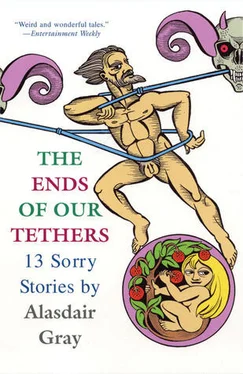near Jerusalem, was
not idiotic.

I SAW A PLAIN STREWN WITH marble rocks, the smallest higher than a man, the largest as big as a cathedral. They were pieces of a statue that had once stood taller than Ben Nevis. Groups of little people moved with horse-drawn wagons among these rocks. They were searching for a piece recognisably human yet small enough to carry away — the lobe of an ear or tip of a toe. Each group wanted to put such a fragment where they could love and pray to it, as it would prove there had once been power, beauty and unity that the world no longer contained. A group found a rock pierced by a beautifully smooth oval arch, part of a nostril. As they lifted it into their cart other groups combined to attack and rob them. This happened to all who found a good fragment, so none was ever carried away and love and prayer were impossible. I opened my eyes because my Japanese host was asking a question.
“In the second chapter of book ten you say till all the seas gang dry, my dear . My useful dictionary defines gang as a band of ruffians or criminals, a number of labourers working together. None of these definitions seems to fit.”
I said that gang was also a Scottish transitive and intransitive verb meaning go and these words were a quotation from Robert Burns’s greatest love song. My host murmured politely, “I believe Robert Burns’s poetry is still sung in parts of North America.”
I nodded. I was happy.
We were in the Smooth Grove, which had been the Central Station Hotel in days when Glasgow was joined to other places by railway. I felt the luxury of a good meal in my stomach, good wine on my palate, clean socks, underwear and shirt against my skin. They had been worth waiting for. Foreign translators, journalists and writers of dissertations always buy me new clothes before standing me a lunch — posh restaurants won’t let me in without new clothes after I’ve slept a few weeks in ones the last foreigner bought me. Foreigners contact me through my bank. Ordinary pubs and all-night cafés accept me since I can pay for drink and food and can sleep in short snatches sitting upright.
I was not always dependent on foreigners for a smart appearance. I used to have several friends with homes and visited each of them once a fortnight. They gave me food and a bed for the night and put my clothes through a machine. Modern machines not only wash, dry and iron, they remove stains, mend holes, replace lost buttons and re-dye faded fabric to look like new. Or am I dreaming that? If I am dreaming such a machine it is certainly possible because, as William Blake said, nothing exists which was not first dreamed. Most of these friends steadily disappeared but were not, I think, stabbed or burned. People with homes still usually die of diseases or a silly accident.
My one remaining friend is now my first wife who pretends to be my daughter. I don’t know why. I visited her a month ago. After enjoying a plate of her excellent soup I asked how Mavis was getting on in London. She stared and said, “I am Mavis. Cathy is dead — died twelve years ago, shortly after I came home.”
“Nonsense Cathy!” I said. “You can’t be Mavis because Mavis quarrelled with you and she was right to quarrel with you because you were not kind to her, though I was too tactful to say so at the time.”
My host in the Smooth Grove was as ancient as I am and still used a notebook. Looking up from it he said, “I hear there is now no middle class in Scotland and England. Is that true?”
I told him it was not true: the middle class are those who used to be called working class — they have jobs but no investments, and their only pensions are state pensions. “But middle class implies a lower class. Who are they?”
I explained that thieves, swindlers, rapists, drug dealers and murderers are our lower class nowadays, many of them registered with the police. They have a place in society because without them police, lawyers, judges, jailers and journalists would be unemployed, and the profits of drug companies would slump.
“So in Britain everyone has a place in the social fabric?”
“Everyone but the homeless,” I answered, trying to remember why I feel perfectly secure though I am one of these.
My host started writing again and to avoid disturbing thoughts I dreamed of a future state in which human police had disappeared because the rich no longer needed them. The rich never left their luxurious, well-defended homes except when visiting each other in vehicles moving at the speed of light. Each home was protected by a metallic creature the size of a kitten and resembling a cockroach. It hid under chairs and sideboards and was programmed to kill intruders. I was a low-class criminal who broke into the apartments of a rich young sexy woman, cunningly reprogrammed her police creature to serve me, then enjoyed a number of sexual acts which appeared to be drawn in a highly coloured, very entertaining strip cartoon of a kind which became popular in France at the end of the twentieth century and in Britain at the start of the next, though many British people then were still able to read. We had a very entertaining country in those days. I had been teaching abroad since the late seventies and every time I returned the changes struck me as so interesting that I wrote about them.
Yes, one year publishers sold my stories to a newspaper cartoon supplement for so much that I stopped teaching and brought my second wife home to Glasgow. She was from Los Angeles or Chicago, I think, and believed that life for prosperous people was the same anywhere, and indeed Britain was now very like America. The police only patrolled the streets of prosperous ghettos where householders had bought crime insurance. The police observed other communities through public surveillance cameras and had power to swoop in and uplift anyone on suspicion, but they mainly lifted unregistered politicians and folk who owed money to drug dealers. When people fell down in the street it was no longer etiquette to help them up or summon an ambulance. We hurried past knowing that next day they would probably be gone. I had a lovely home in those days. I lost it in a wave of inflation which suddenly made life astonishingly interesting. My wife returned to the USA.. I stayed out of curiosity though British publishing had stopped. Not even newspapers were produced. Industries with a use for wood and rag pulp bought the remaining libraries. Some books are still used to give public houses an old-fashioned look. Boys’ adventure stories from the 1910s predominate.
My host said, “Toward the end of your eleventh book you mention no concurrency of bone . What do you mean by that?”
All foreigners ask that question. I can now answer it without thinking. While doing so I closed my eyes and enjoyed walking on a grassy hilltop beside a tall, slender, beautiful young woman I had loved when I was fifty. Even in this dream I knew our love was in the past, that my virility was dead and that no beautiful woman would ever love me again. I told her this. She grew angry and called me selfish because I was only dreaming of her to cheer myself up. This was obviously true so I forgot her by staring at a hill on the far side of a valley, a Scottish hill soaring to Alpine heights with all the buildings I have ever known in rows between strips of woodland, heather and rocky cliffs. On the crest of the mountain I saw the red sandstone gable of the tenement where I was born in 1934, at the bottom I recognised the grey clock tower of the Smooth Grove where I was dining and dreaming. The scene delighted me by its blend of civilisation and wilderness, past and present, by the ease with which the eye grasped so much rich intricacy. Suddenly the colour drained from it. The heather turned grey, the trees leafless, but I still felt perfectly safe and remembered why.
Читать дальше













